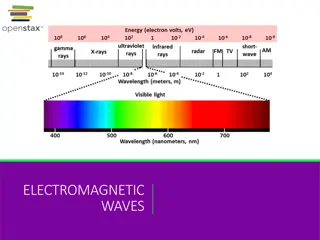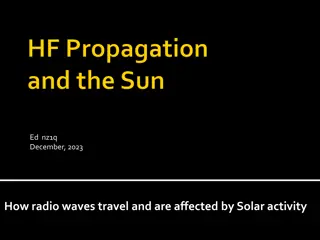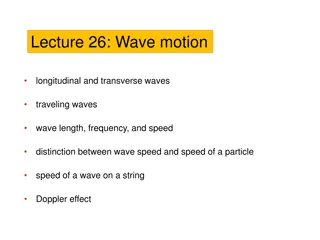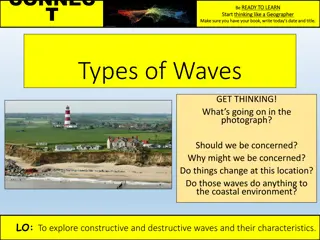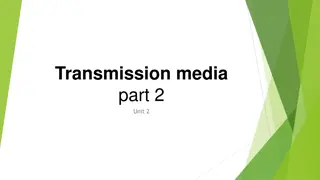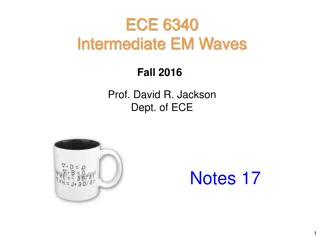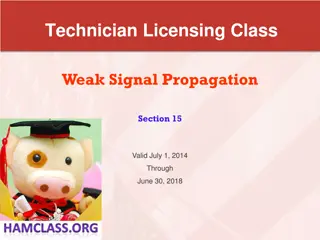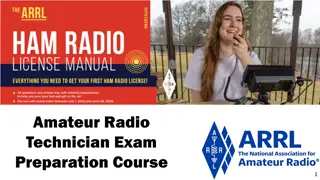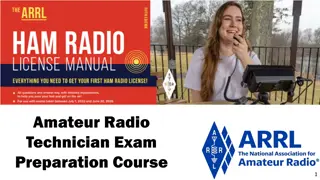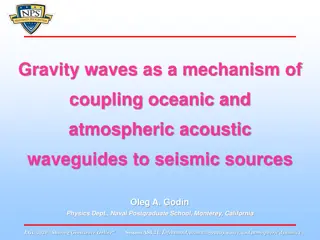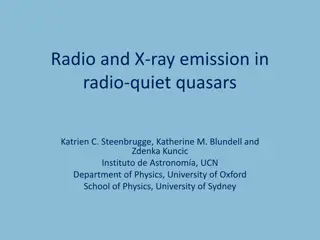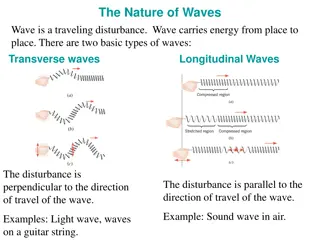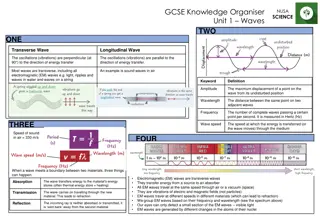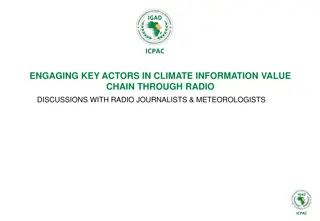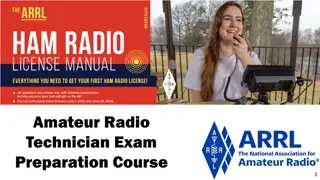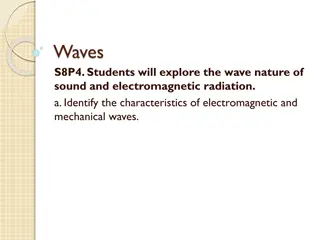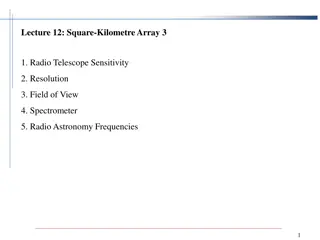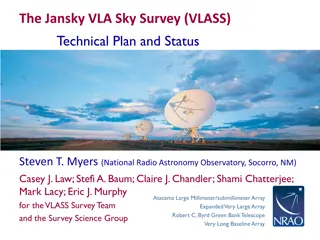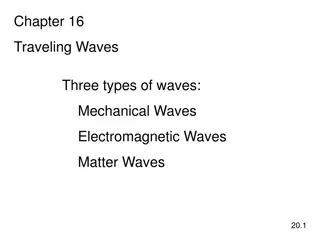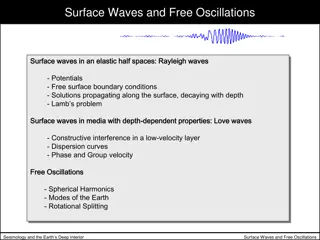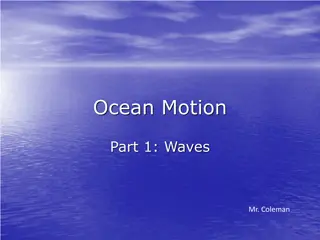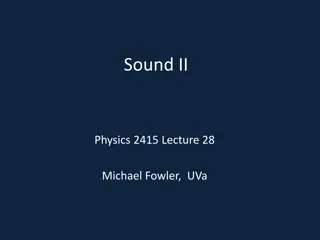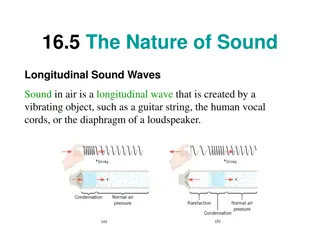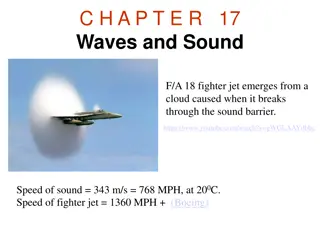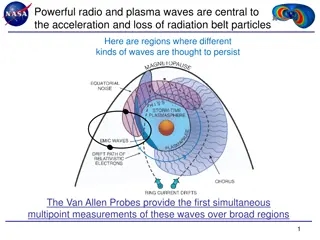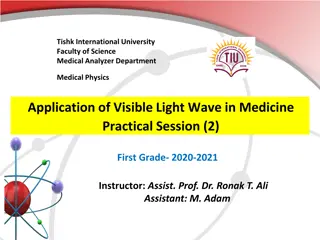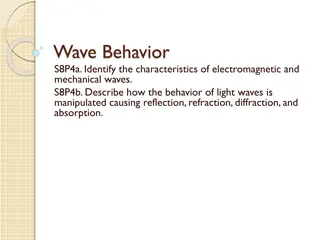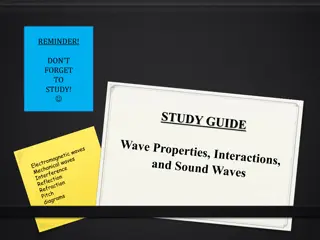Understanding Brain Waves: Frequencies and Behaviors
Brain waves are electromagnetic signals produced by the brain, categorized by frequencies into Delta, Theta, Alpha, and Beta waves, each associated with different states of consciousness and behaviors. These waves play a crucial role in our brain's energy utilization and overall functioning.
1 views • 11 slides
Understanding Software-Defined Radio (SDR) with GNU Radio Introduction
Software-defined radio (SDR) revolutionizes radio technology by enabling flexible software-based solutions that can alter transmitter parameters without hardware changes. The SDR tiers defined by the SDR Forum provide evolving capabilities in terms of flexibility, transitioning from hardware-control
5 views • 54 slides
Understanding Electromagnetic Waves: Maxwell's Contributions and Hertz's Observations
James Clerk Maxwell's groundbreaking work in the 19th century revealed the fundamental nature of light as an electromagnetic wave. His equations formed the basis for understanding the interplay between electricity and magnetism, predicting the existence of electromagnetic waves. Heinrich Hertz furth
4 views • 24 slides
Understanding Sound Waves and Human Hearing
Sound waves are longitudinal waves where particles move in the same direction. The human body hears sounds through vibrations reaching the cochlea, which produces electrical signals for the brain to interpret. Properties of sound waves include traveling through various mediums at different speeds. F
2 views • 10 slides
Understanding Earth's Interior through Seismic Waves: Part 1
Seismic waves provide crucial evidence about Earth's composition and structure. By analyzing the behavior of primary, secondary, and surface waves, scientists can determine the different layers and materials within the Earth. Primary waves travel through both solid and liquid parts, while secondary
10 views • 10 slides
Understanding Types of Waves and Energy Transport
Explore the different types of waves such as transverse, longitudinal, and surface waves, along with electromagnetic waves. Learn about their properties, how they move through mediums, and their significance in various applications like sound transmission, earthquake detection, and energy transport.
3 views • 10 slides
Understanding Radio Wave Propagation and Solar Activity Effects
Explore how radio waves travel and are influenced by solar activity. Learn about HF radio wave propagation, critical layers, day-night cycle effects, sunspots, coronal mass ejections, solar wind, auroras, and more. Discover the impacts of solar flux, sunspot numbers, and solar flares on radio wave c
7 views • 45 slides
Exploring Types of Waves and Energy Transport
Discover the various types of waves such as transverse, longitudinal, surface, and electromagnetic waves, along with their characteristics and applications in energy transportation. Learn about the differences between mechanical and electromagnetic waves, how waves transmit energy, and their signifi
3 views • 10 slides
Understanding Wave Motion: Longitudinal and Transverse Waves
Explore the fundamentals of wave motion including longitudinal and transverse waves, wave length, frequency, speed, and the Doppler effect. Learn about different types of waves, their characteristics, and the distinction between wave speed and the speed of a particle. Discover the properties of wave
2 views • 18 slides
Understanding Constructive and Destructive Waves in Geographical Context
Exploring the characteristics of constructive and destructive waves in geography. Learn how waves are formed, what happens when they reach the coast, and their impact on the coastal environment. Dive into the dynamics of wave movement and the distinctions between constructive and destructive waves.
0 views • 10 slides
Understanding Different Types of Wireless Transmission Media
Wireless transmission encompasses various forms of unguided media, including radio, microwave, and infrared waves. Each type serves unique communication purposes based on their frequency ranges, wavelengths, and propagation characteristics. Wireless signals, whether through radio waves with extensiv
0 views • 6 slides
Understanding Waves: A Visual Exploration
Explore the fascinating world of waves through visually engaging images and interactive clickers. Learn about different types of waves, including longitudinal and transverse waves, and discover what waves carry - energy, not matter. Delve into the concepts of mechanical and electromagnetic waves, an
1 views • 37 slides
Understanding Radio Wave Propagation in the Ionosphere
Radio wave propagation in the ionosphere is influenced by factors such as the radio refractive index and absorption of radio wave energy. This chapter delves into the interaction of radio waves with the ionosphere, discussing concepts like the electromagnetic spectrum nomenclature and the frequency
0 views • 15 slides
Understanding General Plane Waves in Electromagnetic Theory
This study focuses on the analysis of general plane waves in electromagnetic theory, covering topics such as the general form of plane waves, Helmholtz equation, separation equation, wavenumber vector, Maxwell's equations for plane waves, and the symbolic representation of plane waves. The content d
0 views • 41 slides
Understanding Interference and Beats in Waves
Explore the fascinating phenomena of interference and beats in waves, where overlapping waves interact to create patterns of constructive and destructive interference. Witness how sound waves can also produce beats when interfering in time, resulting in a slow envelope effect. Delve into the princip
0 views • 40 slides
Understanding Weak Signal Propagation in Radio Waves
This informative content delves into weak signal propagation and its various aspects related to electromagnetic waves, particularly in the context of radio communication. It covers topics such as radio waves, radio horizon, knife-edge diffraction, tropospheric scatter mode, auroral reflection, and m
1 views • 37 slides
Understanding Radio Wave Propagation for Amateur Radio Technicians
Discusses the various ways radio waves propagate based on frequency and environmental characteristics, including line of sight, ground wave, and sky wave. Explains how radio energy travels in a straight line, follows the Earth's surface, reflects, refracts, and diffracts. Covers multipath interferen
0 views • 120 slides
Amateur Radio Technician Exam Preparation Overview
Dive into the world of Amateur Radio Technician Exam Preparation with a focus on licensing regulations, types and classes of licenses, sample licenses, exam procedures, and more. Learn about the FCC's rules for the amateur radio service, licensing terms, the different classes of licenses available,
1 views • 51 slides
Gravity Waves as a Mechanism of Coupling Oceanic and Atmospheric Acoustic Waveguides to Seismic Sources
Direct excitation of acoustic normal modes in horizontally stratified oceanic waveguides is negligible for shallow earthquakes due to velocity disparities. This study evaluates the contribution of scattering by hydrodynamic waves in generating abyssal T-waves. The research explores the role of scatt
1 views • 6 slides
Insights into Radio and X-ray Emission in Radio-Quiet Quasars
Radio galaxies are categorized as radio-loud or radio-quiet based on the presence of jets and lobes. Unlike radio-loud quasars, the nuclear radio emission in radio-quiet quasars does not originate from large-scale jets. Possible explanations include broad absorption lines, magnetically accelerated e
0 views • 15 slides
Exploring the Nature of Waves and Sound
Understanding the nature of waves, both transverse and longitudinal, and their properties such as amplitude, wavelength, and frequency. Delve into the world of water waves, periodic waves, and the speed of waves on a string. Learn about the longitudinal nature of sound waves, the audible frequency r
0 views • 16 slides
Understanding Waves: Properties, Behaviors, and Applications
Waves come in different forms - transverse and longitudinal - each with distinct characteristics and behaviors. Understanding concepts like amplitude, wavelength, frequency, and wave speed is crucial in grasping how waves transfer energy through different materials. The interaction of waves with bou
0 views • 9 slides
Overview of GRANDproto Project Workshop on Autonomous Radio Detection
GRANDproto project workshop held in May 2017 focused on improving autonomous radio detection efficiency for the detection of extensive air showers (EAS). Issues such as detector stability and background rates were discussed, with the goal of establishing radio detection as a reliable method for EAS
1 views • 14 slides
Engaging Key Actors in Climate Information Value Chain Through Radio Discussions
In this discussion, the importance of engaging key actors along the climate information value chain through radio discussions is emphasized. The symbiotic relationship between radio journalists and meteorological authorities is highlighted, as well as the key actors involved such as Government Agenc
0 views • 22 slides
Exploring Fast Radio Bursts (FRBs) and Scintillations in the Universe
Fast Radio Bursts (FRBs) are millisecond-duration bursts of radio waves originating from outside our galaxy, offering researchers a unique opportunity to investigate baryon distributions and probe the cold gas clumps in the Universe. Scintillations in radio waves caused by irregularities in the inte
1 views • 25 slides
Understanding Radio Communication Essentials for Amateur Radio Technician Exam
Dive into the fundamentals of radio communication for the Amateur Radio Technician Exam. Explore topics such as modulation, equipment, transmission, reception, and the art of adding and extracting information from radio waves. Gain insights into how information is converted, transmitted, and receive
0 views • 105 slides
Understanding Waves: Characteristics and Types Explained
Explore the wave nature of sound and electromagnetic radiation, distinguishing between electromagnetic and mechanical waves. Waves are energy-carrying disturbances that do not transport matter. Mechanical waves require a medium for energy transfer, while electromagnetic waves can travel through spac
0 views • 26 slides
Understanding Radio Telescope Sensitivity and Resolution in Radio Astronomy
This lecture covers the concepts of radio telescope sensitivity in detecting small temperature variations from the sky, including factors such as radiometric sensitivity, antenna noise temperature, receiver system noise, and more. Additionally, it touches upon the resolution capabilities of radio te
0 views • 22 slides
The Jansky VLA Sky Survey (VLASS) Technical Plan and Status Summary
The Jansky VLA Sky Survey (VLASS) is a comprehensive project aimed at capturing unique snapshots of the radio sky through various radio studies and imaging techniques. The survey covers a wide range of frequencies and configurations, enabling detailed exploration of the radio universe. With a focus
0 views • 10 slides
Understanding Traveling Waves: Types, Properties, and Equations
Explore the world of traveling waves, including mechanical, electromagnetic, and matter waves. Learn about transverse and longitudinal wave motion, the speed of waves in strings, wave frequency, wavelength, and speed relationships, as well as wave equations for non-repeating waves over space and tim
1 views • 30 slides
Understanding Standing Waves in Physics
Standing waves in physics are periodic waves that result from the interference of reflected and inverted waves, creating nodes and antinodes along a medium. These standing wave patterns can be observed in vibrating strings, such as guitar strings, where specific frequencies produce distinct harmonic
0 views • 29 slides
Surface Waves and Free Oscillations in Seismology
Exploring surface waves, potentials, and free oscillations in seismology with a focus on Rayleigh waves, Love waves, and wave equations. Understand the dispersion relation, geometry, and solutions for waves propagating in elastic half spaces and media with depth-dependent properties.
0 views • 55 slides
Understanding Ocean Waves and Their Dynamics
Exploring the science behind ocean waves, this resource delves into why waves occur, the components of a wave, how water moves within a wave, and the effects of waves hitting a beach. From defining waves to discussing wave characteristics, this content provides valuable insights into the fascinating
0 views • 13 slides
Understanding Sound Waves: Harmonic Vibrations and Longitudinal Waves
Exploring the concepts of harmonic string vibrations in musical instruments, longitudinal waves in pipes, boundary conditions at pipe open ends, and the wave equation for waves in two and three dimensions. Topics include interference, Doppler effect, and wavelength calculations for standing harmonic
0 views • 19 slides
Understanding Sound Waves: Nature, Properties, and Characteristics
Sound waves are longitudinal waves created by vibrating objects in air. They cannot propagate in a vacuum. Understanding how we hear involves exploring wave representations and the frequency ranges of sound waves, from infrasonic to ultrasonic. Sound also exhibits objective and subjective properties
0 views • 12 slides
Understanding Waves and Sound: A Visual Exploration
Explore the nature of waves and sound through a visual journey covering topics like transverse waves, longitudinal waves, water waves, periodic waves, wave speed, the speed of a wave on a string, the nature of sound, and the frequency of sound waves. Discover how waves carry energy, the different ty
1 views • 32 slides
Unveiling the Role of Radio and Plasma Waves in Particle Acceleration
Radio and plasma waves play a crucial role in the acceleration and loss of radiation belt particles. The Van Allen Probes provide groundbreaking multipoint measurements of these waves in various regions, shedding light on phenomena such as chorus waves and resonant wave acceleration. Strong correlat
0 views • 8 slides
Understanding Visible Light Waves in Medicine and Physics
Visible light waves play a crucial role in medicine and physics, where they are the only electromagnetic waves that humans can see. These waves create the colors of the rainbow with varying wavelengths, allowing us to perceive different colors and forms of light. Understanding the properties of visi
0 views • 22 slides
Understanding Light Wave Behavior: Reflection and Refraction
Explore the characteristics of electromagnetic and mechanical waves along with how light waves can be manipulated through reflection and refraction. Discover how reflection occurs when waves bounce off surfaces and how refraction bends waves as they move between different mediums, affecting their sp
0 views • 18 slides
Understanding Waves: Definitions and Characteristics
This educational content covers definitions and characteristics of waves, including transverse and longitudinal waves, how waves travel through a medium, interference, earthquake waves, sound properties like amplitude and pitch, the Doppler Effect, and differences between reflection and refraction.
0 views • 10 slides


